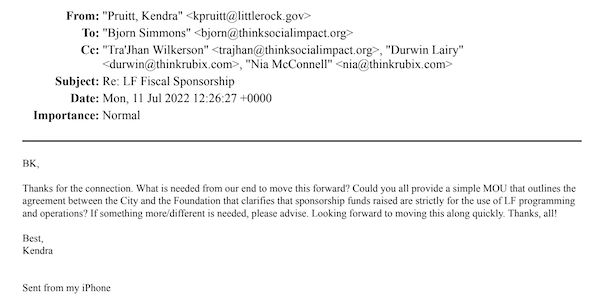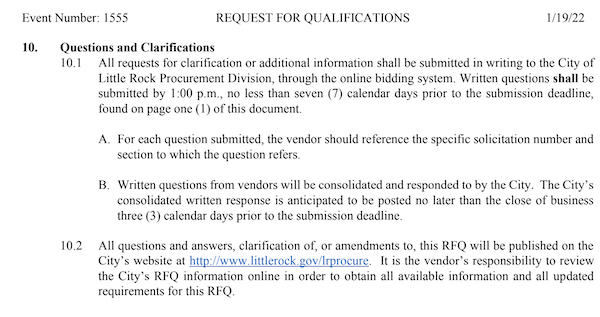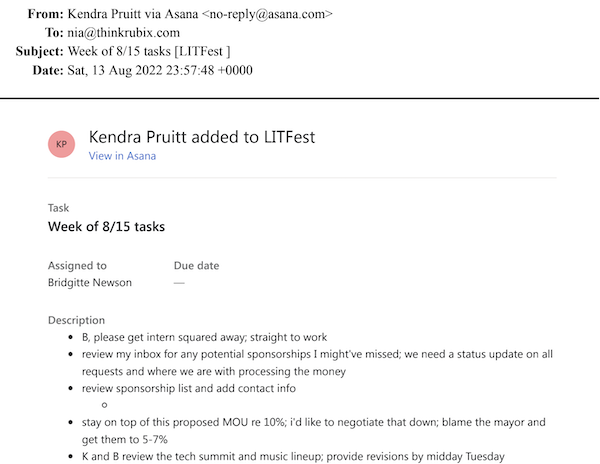I know that yesterday was a while ago, and we’ve all (hopefully) slept since then, but I need you to recall two BHR-related things from the past 24 hours.
First, recall in yesterday’s post about how money was running through Think Rubix’s charity, contrary to what the LITfest contract required, that I wrote:
Now, it is unclear whether this was the plan all long, or if something changed between June 9 and June 30, but by June 30, the communications about the sponsorship letter show that the plans had changed as far as who would be handling the money.
Second, I need you to remember the email from City Attorney Tom Carpenter that he sent in response to Deputy City Attorney (and head of the city’s FOIA division) Alex Betton, after Betton asked if Carpenter knew what I was talking about regarding deleted records:

I didn’t think too much about it at the time, but that “tape of the Procurement meeting where a City employee stated the importance of keeping the amount of the LITfest contract under $45,000 so it would not have to be taken to the Board of Directors” that Carpenter referenced would actually shed some light on the “whether this was the plan all along” question quoted above.
Let’s back up for context. The “tape of the Procurement meeting” is actually a video recording of a WebX call that took place on February 24, 2022, between Mayor Frank Scott’s Chief of Staff Kendra Pruitt, Scott Carter with the City of Little Rock, someone from the city Procurement Office, Tristan Wilkerson of Think Rubix, Ally Washington of Think Rubix, Sharnia McConnell of Think Rubix, and a fourth person from Think Rubix whose name I did not catch.
This meeting occurred a week or so after Think Rubix was selected as the vendor for LITfest based on their response to the city’s Request for Qualifications. The purpose of this meeting was to discuss some of the details of LITfest as part of negotiating the contract that would ultimately be signed by Think Rubix and the city for the production of LITfest.
Got it? Of course you do. You’re smart like that.1 Good. Let’s move on to the aforementioned video.
The video is 48:46 in length, and you can view it in its entirety here. That should take care of anyone who tries to claim that the rest of this post is taken out of context. But the relevant clip that I want to focus on begins at 35:42 in the complete video and 5:34 in the clip below:
The relevant portion begins with Tristan Wilkerson of Think Rubix asking about the scope of the LITfest contract. Kendra Pruitt earlier in the meeting mentioned that the cap on the contract amount for this event was $45,000. In the clip above, Wilkerson is focused specifically on whether Think Rubix or the city will be responsible for the majority of fundraising through sponsorships, and Kendra Pruitt has previously said in this meeting that the city would handle the majority of it, but that Think Rubix would coordinate or assist with this. Based on this answer, Wilkerson asks:
We can bookmark this for additional dialogue, there’s no pressing issue to this now, but–in part because our requirements gathering is going to get us clear, crystal clear about the needs, obviously, to clarify the scope. But it sounds a little bit like some donor-relationship work that will be done that we’ll hold, as well as potential, or prospective, fundraising. Obviously, the lion’s share of it will be with the city, but it seems like some of the blocking and tackling that we may support with. So, to that end–and as I understand it, this is a negotiation–should the scope become a bit more dense in terms of deliverables, what room is there for additional resources to ensure that we can afford that time? Because as y’all know, Durwin [Lairy] is expensive.
Pruitt then replies:
He is that. Um, and worth every penny. I’ll be honest with you, Tristan. I think that the–if we go above [$50,000] with this contract–and Casey, please help me understand–that would trigger a need to go before the Board. Unless it’s a different contract, different, you know, to separate it from this particular contract. It would otherwise be an aggregate, which would trigger the need to go before the Board of Directors. Is that accurate, our procurement professional? [Procurement guy: That’s correct.] Ok, and so, that is, um, that…it becomes political at that point, and that would just be something that we would have to deal with there. I think it’s possible to leverage some sponsorship dollars for additional work as necessary, because that wouldn’t be city money and therefore wouldn’t require that political step, if you will. But that’s kinda me just keeping it as honest with you as I can. That would be the necessary steps that we’d have to take from a procurement standpoint, um, and I don’t know that we want to go before the Board on what they would maybe deem [as] us throwing a party.
Wilkerson continues:
Nope, I understand. What you just shared is where my mind was going, that the revenue streams could support the additional work, so, we would, I think, need to bifurcate so that what the city is paying for is clear cut, and any additional tasks that would need to be covered would need to be resourced from other revenue streams. That’s exactly what I needed to hear from you. I appreciate you.
***
So, I suppose, to answer the original question first, this idea of getting additional money to Think Rubix via sponsorship dollars was in the works from the very beginning.
***
The biggest issue here, in my view, is that they knew from the outset that $45,000 was not going to be the total amount that Think Rubix was paid for LITfest. The $45,000 in the contract was simply–by Pruitt’s own admission–to avoid having to bring the contract before the Board of Directors for a vote.
Now, rules are rules, so I would have minimal (if any) issue with the payment of $45,000, even if that amount was designed to avoid Board approval, if that total was actually the total that Think Rubix was going to be paid. But this meeting in February makes it clear from the start that the city knew they would be paying Think Rubix money above and beyond the contract amount; they were just going to pull that from sponsorship money.
And they didn’t say a word about this in the contract.
And they haven’t said a word about it to anyone else.
And they decided that the best way to do it would be to ignore what the contract said about depositing money into city accounts and, instead, have sponsors just send the money directly to an unregistered entity run by Think Rubix. That way, Think Rubix could get their percentage off the top, and neither they nor the city would have to worry about an additional check from the city that might raise some eyebrows.
The second biggest issue is what I touched on a few sentences ago: the contract that Think Rubix and the City of Little Rock signed is absolutely silent regarding any sponsorship money going to anyone but the city. On the contrary, the contract specifically states that Think Rubix will ensure that all sponsorship funds will be promptly deposited with the city. The contract leaves no wiggle room for some secret, additional agreement that would let the parties ignore this portion of the contract and, instead, direct the money to a nonprofit.
This also makes Pruitt’s statement in this email much sketchier:

Putting something in the MOU–an MOU that still has not been produced, mind you, because Think Rubix’s lawyer continues to play games and risk getting the city sued again–that says that “sponsorship funds raised are strictly for the use of [LITfest] programming and operations” is not exactly true if some percentage of those funds are just for Think Rubix (or the Foundation for Social Impact) to keep.
The third issue with the video is that it brings me back to why Think Rubix? When Think Rubix was putting together their response to the Request for Qualifications, much of which appears to have been done on the day it was due, they did not understand the scope of the work that the RFQ was asking for, by their own admission in that video.
Rather than say, “hey, we didn’t realize that you wanted us to handle actual fundraising stuff, despite the four references to fundraising in the RFQ, so I don’t think we can do this for less than $50,000,” Think Rubix took the approach of, “if we do more than the scope of the RFQ [even though we already admitted that we didn’t understand the scope], how can you pay us more than $45,000.” To which the city could (and should) have said, “It was on you to understand the scope of the RFQ before you responded, which is why we literally had a period during which you could have asked these questions.”

Or the city could have responded, “that’s fine, we’ll just have to get board approval for this, which we also noted was a possibility in the RFQ.” Either of these responses would be totally fine.
Instead, the City of Little Rock, through Kendra Pruitt, responded with, essentially, “Well, we don’t want the Board thinking we’re just having a party, so we need to keep this contract under $50,000, but we can probably funnel you some of the money that we, the city, are going to ask city businesses for, just as long as it doesn’t show up in this contract.”
Then, months after the contract was negotiated, when Think Rubix again mentioned getting a cut of the sponsorship money by having their own 501(c)(3) “charity” handle the money and keep 10%, the city could (and should) have responded, “we can’t have your nonprofit handle the money because that’s not what the contract says; besides we didn’t agree to 10% off the top, we only said that we would use any sponsorship dollars to cover additional payments to you for additional work outside the scope of the RFQ.” Heck, the city could have noted that, at that point in late June/early July when Think Rubix was trying to arrange the 10% cut, that almost nothing had been done, so it was difficult to see why Think Rubix was already asking about additional money.
Instead, Kendra Pruitt just said, “blame the mayor and get [Think Rubix] to 5-7%”

The specific percentage, however, is not the issue.
Whether it was 1%, 10%, or 100% of the sponsorship dollars, the issue is that this was a plan to get additional money to Think Rubix, outside the scope and requirements of the actual contract, and it was a plan that was in place in one form or another from the very first meeting about the contract.
Worse, it is a plan that they came up with specifically to side-step having the Little Rock Board of Directors aware of what was actually being spent.
***
UPDATE 9/30/2022: It seems we are not the only ones who are concerned about this obviously dishonest ploy to get above $50,000 without Board of Directors approval. City Attorney Tom Carpenter sent a letter yesterday to Mayor Frank Scott and the Little Rock Board of Directors, laying out much the same argument, and expressing concern about why the video had not been provided and why Kendra Pruitt was promising far more than $45,000 at the very first procurement meeting.
***
If you like what we are doing here and find Blue Hog Report to be a valuable part of Arkansas politics, please consider subscribing to our Patreon page.
And you have lovely eyes.↩
